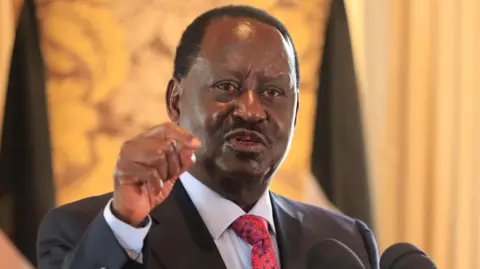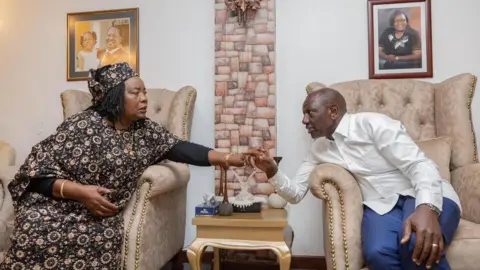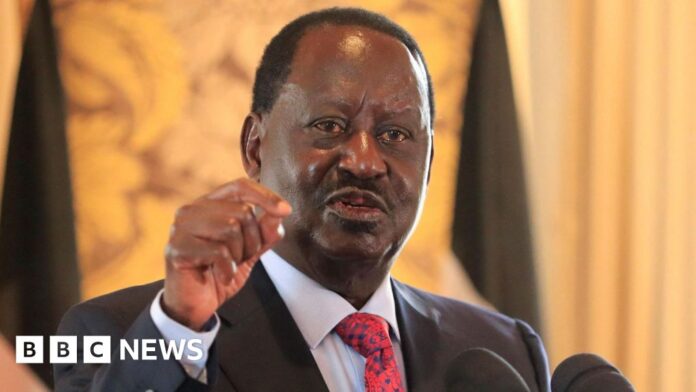 Reuters
ReutersTributes have been paid to former Kenyan Prime Minister Raila Odinga, who has died at the age of 80.
President William Ruto said the veteran politician, who died on Wednesday while receiving medical treatment at a hospital in India, was a “beacon of courage” and “father of our democracy”.
His body is due to be flown back home overnight for a funeral service and burial to be held over the coming days.
Odinga spent many years as an opposition leader, losing five presidential campaigns, most recently three years ago.
In recent weeks, there has been speculation about his health, although family members and political allies had dismissed reports suggesting he was critically ill.
He collapsed during a morning walk and was taken to Devamatha Hospital, about 50km (30 miles) east of the port city of Kochi.
The hospital said he had suffered a cardiac arrest, did not respond to resuscitation measures and was “declared dead at 09:52” local time (04:22 GMT).
“Raila Amolo Odinga is truly a once-in-a-generation leader. A man whose ideals transcended politics, and whose legacy will shape the destiny of Kenya for generations to come,” Ruto said in a live address to the nation.
A seven-day period of mourning has also been declared. Odinga will be also be accorded a state funeral with full military honours, Ruto said.
Other Kenyan politicians and world leaders have been sending their condolences, including Indian Prime Minister Narendra Modi, who described Odinga as a “towering statesman and a cherished friend of India”.
South Africa’s President Cyril Ramaphosa said he was a “leader who placed the interests of his country and continent first” while Zambia’s Hakainde Hichilema described Odinga as “a towering advocate for democracy”, whose legacy would endure. Nigeria’s Bola Tinubu said he “embodied the spirit of Pan-Africanism”.
On Wednesday, Kenya’s parliament observed a minute’s silence in his honour and scheduled a session on Thursday for lawmakers to pay tribute.
The Kenyan president had earlier visited Odinga’s family home in the capital, Nairobi, and expressed his condolences to his widow Ida Odinga and other family members.
It is understood that a delegation, led by Kenya’s Foreign Affairs Minister Musalia Mudavadi and Odinga’s widow, is on its way to India to oversee the arrangements to repatriate his body.
Local officials in Kochi said his body was due to be flown to Mumbai – from where it would be taken to Kenya, and was expected on Thursday morning.
The state funeral will be held at the Nyayo National Stadium in Nairobi on Friday and the following day his body will be transported to Kisumu, a city in western Kenya on the shores of Lake Victoria – his political stronghold.
Members of the public will get a chance to view the body before he is buried on Sunday at his farm in Bondo, about 60km west of Kisumu.
According to the family, it was Odinga’s wish to be laid to rest within the shortest time possible, ideally within 72 hours.
Odinga’s supporters have been pouring on to the streets to mourn, especially in western Kenya and parts of Nairobi.
The disputed election of 2007, in which Odinga claimed he was cheated of victory by Mwai Kibaki, led to the biggest crisis in Kenya’s history.
Violence erupted around the country, resulting in 1,200 deaths and about 600,000 people were forced to flee their homes.
To resolve the crisis, a power-sharing agreement was brokered by former UN Secretary-General Kofi Annan, leading to the formation of a unity government in which Odinga became prime minister.
His frequent claims of fraud were vindicated by Kenya’s highest court after the 2017 elections, when it annulled Uhuru Kenyatta’s victory and ordered fresh polls. However, he boycotted the rerun, demanding electoral reforms.
Odinga later made up with Kenyatta, stunning the nation when the two shook hands in 2018 – ending months of tension.
 State House Kenya
State House KenyaHe has often reconciled with the incumbent president after contentious elections.
After his most recent defeat in 2022, he later joined President Ruto in a so-called broad-based government, which brought several of his allies into key positions.
He defended the move as necessary for national unity, coming in the aftermath of watershed nationwide protests last year that culminated in the storming of parliament. Dozens of protesters were killed in confrontations with security officers.
The Ruto administration backed Odinga’s bid to become chairperson of the African Union Commission, in elections held earlier this year. Despite strong regional support, he lost to Djibouti’s Mahmoud Ali Youssouf.
Odinga inspired a passionate and loyal following throughout his political career. His supporters called him “Baba” (Father), “Agwambo” (Act of God), and “Tinga” (Tractor) – drawn from his party’s symbol during the 1997 elections.
He was widely regarded as a master strategist and mass mobiliser, often drawing huge crowds to his political rallies, and he had a deep ability to connect with ordinary people.
He will be remembered for his unwavering fight for democratic freedoms and human rights.
He was a former political prisoner, and holds the record for being Kenya’s longest-serving detainee. His struggle against one-party dictatorship saw him detained twice (from 1982 to 1988 and 1989 to 1991) during the rule of Daniel arap Moi.
He was initially imprisoned for trying to stage a coup in 1982, which propelled him on to the national stage.
For most of his political life, Odinga has been seen as symbol of resistance and political reform and his death leaves a vacuum about who can fill his shoes and carry on his legacy.
He is the son of Jaramogi Odinga, Kenya’s first vice-president, who walked out of government after falling out with then-leader Jomo Kenyatta, Uhuru Kenyatta’s father.
Additional reporting by the BBC’s Roncliffe Odit and Akisa Wandera in Nairobi
You may also be interested in:
 Getty Images/BBC
Getty Images/BBCSource link







